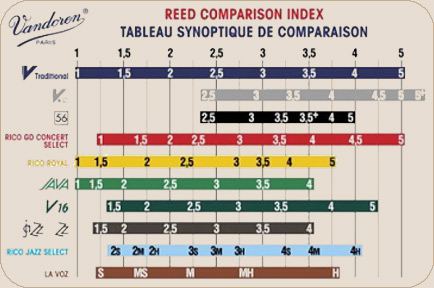No products
(livraison non comprise)
Prices are tax included
FAQ
Frequently asked Questions :
What is the best way to cure his reeds" ?
Play the new reeds every day for only a few minutes for the prowl.
How to play with a reed too tenuous or too easy ?
If a reed is too tenuous, rubbing the table (flat part of the reed on the sandpaper end, in light circular movements. If a reed is too easy, cut off the end of the reed of a hair using a cutting reeds.
Is it better to moisten the reed with water or with his own saliva ?
It may be preferable to use the water to wet the reed. A few people have a saliva more acid that can wear away more quickly the fibers of the reed. Make sure whatever it is will not leave a reed in the water for too long, which would lead to distortions.
What is the best strength reed to start with ?
It all depends on the equipment used (nozzle and instrument) ! In general, the 2 ½ is quite suitable for new musicians.
Useful tips :
- Don't play reeds too strong or too weak, that is to say, badly adapted to the opening of the spout.
- To run in the reeds : the playing few minutes per day for some time before adopting them.
- Do not get used to a single reed. The clamp is hard as the reed is weakened. All reeds new look then too strong.
- Choosing a reed according to the place where we play :
- a reed easier in a place, sound or dry (air-conditioning)
- reed sustained in a silent room, in the open air, or in a humid place.
- A musician used to playing with a reed 3 1/2 will choose a reed no. 3 if he plays in a room with air-conditioning, or a reed no. 4 if he has to play in a very wet region.
It is necessary to "look on the bright side" its the reeds
The students told me : "You always have good reeds ", and I answered them : "yes, these are the same as yours" Henri Dionet (ex-soloist at the Opera and professor at the Conservatory of Versailles)
Interview with Guy Dangain, Jean-Paul Gauvin
The reed is fundamental in the design of the sound ?
Of course, the reed is used to shape the sound (...), it is much more than a piece of wood, it is the soul of the blower.
Is it necessary to have one or more reeds of reference ?
Any passionate musician and serious was not a reed reference, it has reeds, which allow him to find an " ideal ". In addition, the rotation of the reed is important : the more you get used to playing reed strength a bit different, more these reeds will eventually stabilize. It is not to copy his neighbor, because he uses 2 reeds per month or, on the contrary, 2 boxes. The essential thing is that each musician finds his account ; which means that each reed can find a buyer.
What is the ideal position of the reed on the spout ?
The morphology of each one, his mouth, are not always be in line immediate with the reed ; on the other hand, there is today a great diversity of beaks (example : facet wide or thin at the end of the spout). This leads us to think that the position of the reed may vary.
A few small tips
A reed a little can easy find its place in the making protrude very slightly from the beak (we will find a roundness of sound, while retaining its flexibility).
The lateral displacement of the reed (left or right) can bring him to find the perfect balance.
A few clarifications
In addition to the quality of the reed, the main factors that affect the outcome of a reed are :
- material : its association with other elements
- physical : the embouchure ( lips, jaw, oral cavity) and the air column
- physiological : the acidity of the saliva, for example
- climatic and acoustic : the weather, the noise environment in which one plays ; you play ? the wood also...
In the Face of these variable parameters, the master word is, therefore, an "adaptation" of all the moments.It is very useful to limit the subjectivity as much as possible :
- knowing the reactions of her material in different situations
- by asking the opinion of musicians who are familiar with your style of game, or by registering yourself
The success is at the end : getting to "optimize" its reeds, it is get the best out of themselves at the time desired.
Avoid playing too long a reed neuve, play a reed a little more than its strength " obvious ", work on the reed for the prowl, can be tips make good sense to acquire this flexibility of the mouth that allows us to face different situations.

